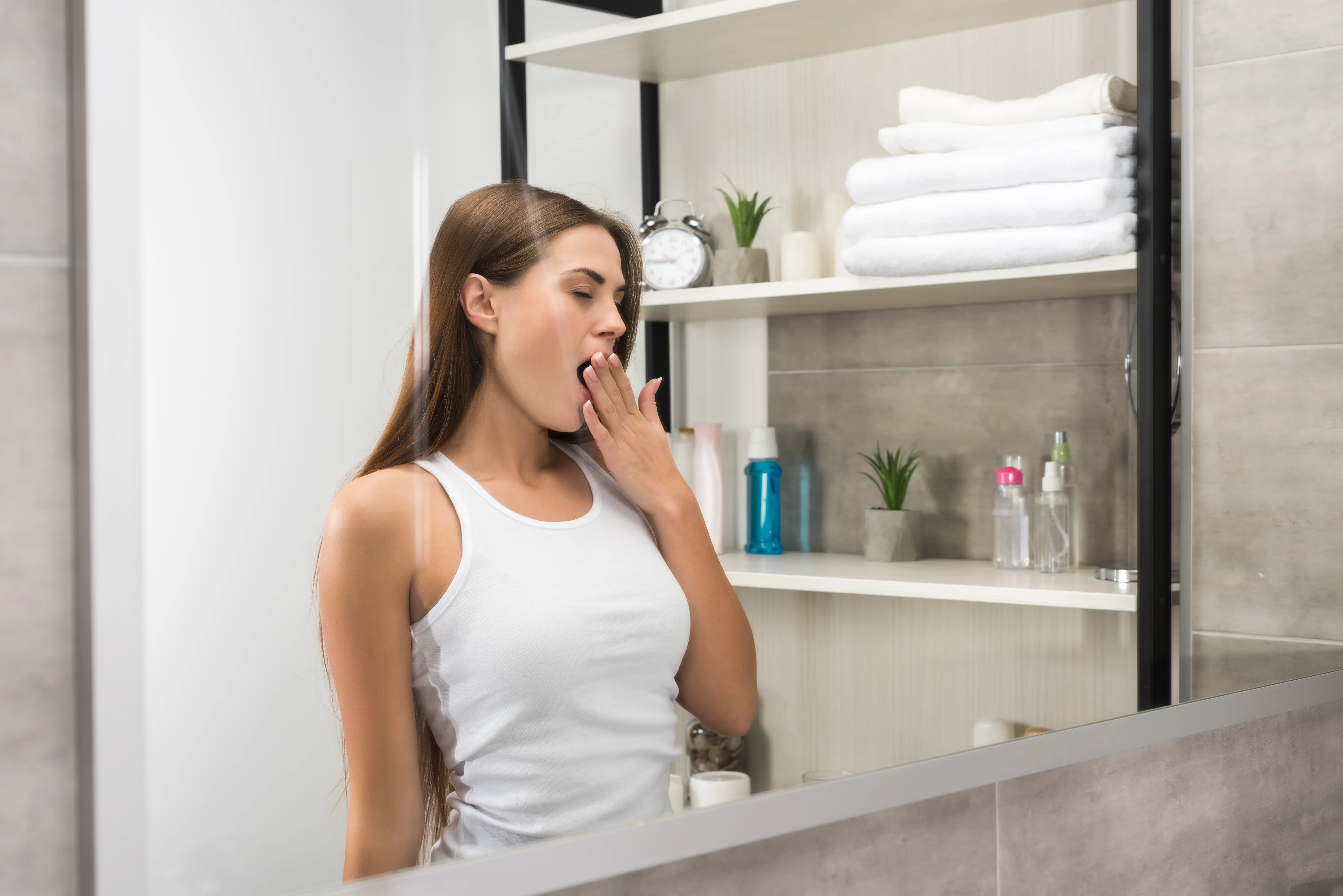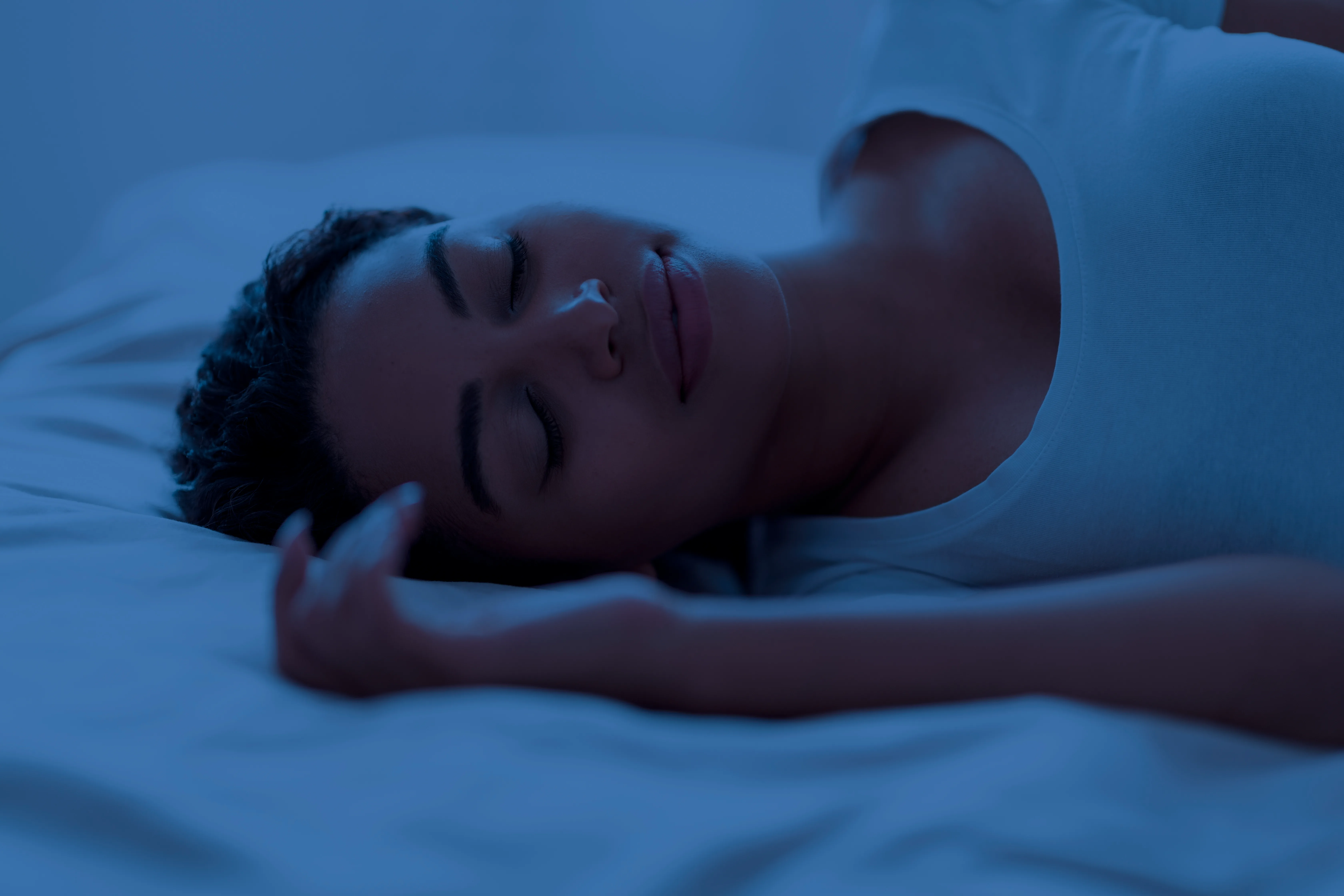Waking up with a dry, sticky mouth can be uncomfortable and frustrating. Dry mouth at night occurs when the salivary glands do not produce enough saliva, leading to dehydration, irritation, and potential oral health issues.
In this article, we will understand the causes and find effective solutions that can help improve sleep quality and overall health.
Common Causes of Dry Mouth at Night

Saliva plays a crucial role in keeping the mouth moist, washing away bacteria, and aiding digestion. At night, saliva production naturally decreases, but some factors can make the problem worse, leading to excessive dryness.
Dehydration
Not drinking enough water throughout the day can lead to dehydration, reducing saliva production. When the body lacks sufficient fluids, the salivary glands struggle to maintain adequate hydration levels in the mouth, causing dryness, especially at night.
Mouth Breathing or Snoring
Breathing through the mouth while sleeping, whether due to nasal congestion, allergies, or habitual snoring, can quickly dry out saliva. Airflow over the tongue and gums causes moisture to evaporate, leading to a dry and uncomfortable mouth upon waking.
Medications That Cause Dry Mouth
Many medications have dry mouth as a side effect, as they can interfere with saliva production. Some of the most common culprits include:
- Antidepressants: Affect neurotransmitters that regulate saliva flow.
- Antihistamines (for allergies and colds): Reduce mucus and saliva production, leading to dryness.
- Decongestants: Help clear nasal passages but can dry out the mouth in the process.
- Blood Pressure Medications: Some cause reduced saliva flow, contributing to nighttime dryness.
- Pain Relievers: Certain medications, including opioids, may cause dehydration and dry mouth.
- Diuretics: Increase urine production, which can lead to dehydration and reduced saliva levels.
Underlying Medical Conditions
Certain health conditions can contribute to dry mouth at night by directly affecting saliva production or increasing dehydration. These include:
- Diabetes: Diabetes and high blood sugar levels can lead to dehydration, reducing saliva production.
- Sjogren’s Syndrome: An autoimmune disorder that directly affects the salivary glands, causing chronic dry mouth.
- Anemia: Anemia or lack of red blood cells, can result in reduced oxygen and nutrient delivery to the salivary glands, impairing function.
- Acid Reflux (GERD): Stomach acid can irritate the throat and mouth, leading to inflammation and dryness or even GERD.
Sleep Apnea and CPAP Machine Use
People with sleep apnea often experience dry mouth due to interrupted breathing patterns, which can lead to frequent mouth breathing.
Additionally, CPAP (Continuous Positive Airway Pressure) machines, used to treat sleep apnea, can contribute to dryness by delivering a continuous stream of air that may reduce saliva levels.
Lifestyle Factors
Certain lifestyle habits can contribute to nighttime dry mouth. Consuming caffeine or alcohol before bed can lead to dehydration, while smoking reduces saliva production and irritates the mouth and throat.
Poor oral hygiene and lack of regular hydration throughout the day can also worsen dry mouth symptoms at night.
Symptoms of Dry Mouth at Night

Experiencing dry mouth at night can cause discomfort and impact oral health. Below are the common symptoms, along with how they affect the body:
Sticky or Dry Feeling in the Mouth
A persistent dry or sticky sensation in the mouth is one of the most noticeable symptoms of dry mouth at night.
This occurs when the salivary glands produce insufficient saliva, leaving the mouth feeling parched. It can make swallowing, speaking, and even breathing uncomfortable, particularly after waking up.
Frequent Thirst
Waking up with an unquenchable thirst is a common sign of dry mouth. Since saliva helps maintain moisture levels in the mouth, a decrease in saliva production can lead to dehydration signals, making you feel constantly thirsty, even after drinking water.
Sore Throat
A dry mouth often leads to a sore or scratchy throat, especially in the morning. Saliva acts as a natural lubricant for the throat, and its absence can cause irritation, making swallowing more difficult and uncomfortable. This symptom is particularly common in people who breathe through their mouths at night.
Cracked Lips
Without enough saliva, the lips can dry out quickly, leading to cracks, peeling, and irritation. This can make simple movements like talking or eating painful and can increase the risk of infections if the skin around the lips becomes overly dry and damaged.
Bad Breath
Saliva plays a crucial role in washing away bacteria and food particles that contribute to bad breath. When saliva production is low, bacteria can accumulate in the mouth overnight, leading to an unpleasant odor in the morning. This can be more pronounced in individuals who sleep with their mouths open.
Hoarseness
A lack of moisture in the mouth and throat can cause the vocal cords to dry out, leading to hoarseness or a raspy voice in the morning. This is especially common in people who talk a lot during the day, breathe through their mouths at night, or suffer from acid reflux.
Gum Disease
Saliva contains enzymes and minerals that help protect the gums from harmful bacteria. When saliva production is reduced, bacteria can build up along the gumline, increasing the risk of gingivitis and gum infections. Over time, this can contribute to gum disease, leading to inflammation, bleeding, and even tooth loss.
Increased Cavities
Saliva helps neutralize acids and wash away food particles that can lead to tooth decay. Without enough saliva, acids from food and bacteria linger on the teeth, increasing the risk of cavities.
People with chronic dry mouth may notice a higher frequency of tooth decay, even if they practice good oral hygiene.
How to Prevent and Treat Dry Mouth at Night

Stay Hydrated Throughout the Day
Drinking enough water throughout the day helps maintain saliva production and prevents dehydration, which can contribute to dry mouth at night.
Breathe Through Your Nose, Not Your Mouth
Mouth breathing dries out saliva and worsens dry mouth symptoms. Practice nasal breathing and address any nasal congestion that may force you to breathe through your mouth.
Learn more about: Sleeping Positions for Breathing Problems
Use a Humidifier
A dry sleeping environment can worsen dry mouth. Using a humidifier adds moisture to the air, preventing excessive dryness in the mouth and throat.
Adjust Your Sleeping Position
Sleeping on your back may encourage mouth breathing. Try sleeping on your side or elevating your head slightly to reduce nighttime dryness.
Avoid Certain Foods and Drinks Before Bed
Some foods and beverages can contribute to dehydration or reduce saliva production, worsening dry mouth at night.
Caffeine acts as a diuretic, increasing fluid loss and drying out the mouth. Alcohol can also reduce saliva flow and lead to dehydration, making dry mouth symptoms more noticeable.
Maintain Good Oral Hygiene
Practicing good oral hygiene is essential for preventing dry mouth and maintaining overall oral health.
Brushing and flossing regularly removes bacteria and food particles that can contribute to dryness and irritation. Using an alcohol-free mouthwash can help avoid additional drying effects while keeping the mouth fresh.
Try Natural Remedies for Dry Mouth
Several natural remedies can help alleviate dry mouth symptoms and promote saliva production. Chewing sugar-free gum or sucking on sugar-free lozenges can stimulate saliva flow, keeping the mouth moist.
Drinking herbal teas like chamomile or ginger tea may also provide soothing effects for the mouth and throat.
Another effective remedy is coconut oil pulling, which can help maintain moisture in the mouth while preventing bacterial buildup. Incorporating these simple remedies into your routine can offer relief and improve overall oral comfort.
FAQs
Why do I wake up with a dry mouth at night?
Dry mouth at night, also called nocturnal xerostomia, occurs when saliva production decreases. Common causes include dehydration, breathing through the mouth, sleep apnea, medications (such as antihistamines and antidepressants), and certain medical conditions like diabetes or Sjögren’s syndrome. Sleeping in a dry environment or consuming alcohol and caffeine before bed can also contribute.
How can I prevent dry mouth while sleeping?
Preventing dry mouth at night involves staying hydrated throughout the day, avoiding alcohol and caffeine before bed, and using a humidifier to add moisture to the air. Switching to nasal breathing with the help of nasal strips or addressing sleep apnea can also help. If medications are the cause, consulting a doctor about alternatives may be beneficial.
Is dry mouth at night a sign of a serious health condition?
While occasional dry mouth is common, persistent dryness may indicate an underlying health issue. Conditions like diabetes, Sjögren’s syndrome, or sleep apnea can contribute to reduced saliva production. It can also be a side effect of certain medications for anxiety, depression, allergies, and high blood pressure.
Can dry mouth at night cause dental problems?
Yes, chronic dry mouth can lead to dental issues because saliva plays a crucial role in washing away bacteria and neutralizing acids that cause tooth decay. Without sufficient saliva, the risk of cavities, gum disease, and bad breath increases.
What are the best home remedies for dry mouth at night?
Home remedies for dry mouth at night include sipping water before bed and keeping a glass nearby, using a humidifier to maintain moisture in the air, and avoiding mouth-drying substances like alcohol, tobacco, and caffeine. Chewing sugar-free gum or sucking on xylitol lozenges can stimulate saliva production.
Conclusion
Dry mouth at night can be more than just an inconvenience—it can affect sleep quality and lead to long-term oral health problems. Identifying the root cause, whether it’s hydration, medication side effects, or lifestyle factors, is essential for effective management.
Jessica H.
Jessica is a reviewer, writer, and sleep enthusiast at Sleepiverse. Jessica graduated with her master's degree in Nursing research and education. She is a registered nurse and currently works in the Intensive Care Unit. Since becoming a nurse, Jessica has worked the night shift, which means a disrupted sleep schedule. Knowing she needed to function at her best while caring for patients at night, she spent a lot of time researching how to sleep well with a difficult schedule.


